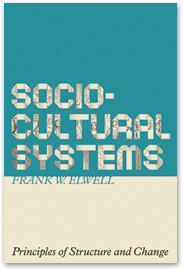
Sociocultural Systems: Principles of Structure and Change Macrosociology: Four Modern Theorists A Commentary on Malthus" 1798 Essay as Social Theory Great Classical Social Theorists In the Classical Tradition: Modern Social Theorists Dr. Elwell's Professional Page
|
rbert Spencer's Evolutionary
Sociology Immanuel Wallerstein | |
|
Wallerstein’s Crisis of Capitalism
By Frank W. Elwell
There are three features of the capitalist system that are essential in
its continuation:
Wallerstein posits that it is these three features of the system that
have been at the root of capital accumulation; yet the very success of
the system has led to forces that are undermining this foundation. As it
expands throughout the world capitalism is rapidly losing the easily
exploitable portion of its
labor
market. Workers in formerly peripheral
areas are increasingly demanding living wages, decent working hours, and
a higher standard of living. The threat to the capitalist world system,
according to Wallerstein, is the spread of democracy.
“The demands for income, health care and education, in particular, seem
to be insatiable. To the extent that there is democratization, people
insist not merely on having these three, but on regularly raising the
minimal threshold for each. But having these three, at the level that
people are demanding each day, is incredibly expensive, even for the
wealthy countries not to speak of for Russia, China, and India. The only
way everyone can really have more of these is to have a radically
different system of distribution of the world’s resources than we have
today” (2000, 386).
Mass media and the newer social media, of course, serve as a stimulus
for democratization as well as demands for consumer goods throughout the
world system.
Another threat facing capital, according to Wallerstein, is the
“ecological crisis” caused by development. “What we mean by historical
capitalism is a system in which the institutions that were constructed
made it possible for capitalist values to take priority, such that the
world-economy was set upon the path of the commodification of everything
in order that there be ceaseless accumulation of capital for its own
sake” (1999, 78). When environmental issues get in the way of profits,
it is the accumulation of capital that rules. Companies that dep
The ecological crisis must necessarily intensify, Wallerstein explains,
as corporations expand their markets and more people around the world
are being integrated into consumer culture (76-82). As the crisis
intensifies the budgets of national governments are increasingly
stretched to provide for the cleanup. This, predicts Wallerstein, will
cause governments to try to force companies to internalize these costs,
which will cut deeply into their capital accumulation (31). Increasing
costs for labor and for environmental clean-up cannot simply be passed
on to the consumer in the form of higher prices. “That is to say, the
‘market” constrains the sales price, in that, at a certain point, the
price becomes so high that the total sales profit is less than if the
sales price were lower” (79). Thus the need to pay more for labor and
environmental cleanup seriously erodes capital accumulation (81).
A third threat to the capitalist world-system is the decline in the
power of the state. From the beginning, Wallerstein (and others) have
argued, state power is essential for the capitalist world-system in
keeping order at home, sponsoring monopolies, military threats, and
favorable
trade agreements with periphery and semi-periphery areas. The
state also supports profits through purchasing and tax policies,
building roads, sewers, airports, and other supports for capital, and
acts to “soften discontent of the dangerous classes” through the
establishment of welfare (1999, 63-74). But the state, according to
Wallerstein, is rapidly losing legitimacy as liberal reform has failed
to fundamentally address poverty, depletion, pollution, structural
unemployment, and a host of other social problems. The system is in
terminal crisis, Wallerstein argues, because all of the avenues of
significant capital accumulation are being narrowed; capital
accumulation no longer has free reign, nor can the state easily lift the
restrictions (80-85).
The coming decades, Wallerstein (2000) predicts, will see the disorder
continue to mount. “Capitalists will seek support from state structures
as they have in the past. States will compete with other states to be
the major loci of the accumulation of capital” (431). More and more of
social life will be commodified, polarization of wealth and power w
Because our economic-political system is one of capitalism a great part
of the sociocultural system (as well as the world-system) is organized
around and infused by its need for expansion. It is this drive that is
behind the ever more detailed division of labor, the adoption of
computers and other technologies to replace workers, the economic
squeezing of the working and middle classes, globalization and
outsourcing, immigration, the commodification of social life, the
degradation of work and workers, the economic, political, and cultural
polarization within and between societies, and the rising tide of
alienation and anomie. However, capitalism is not the only force at work
causing these changes. Capitalism is an economic-political system that
has prominent place in the sociocultural web in which population,
technology, environment, bureaucracy, the state, primary groups, and
such cultural elements as science, rationalization, nationalism, and
human values, traditions, and beliefs evolve. These forces—never alone
but always in interaction with one another (sometimes reinforcing,
sometimes contradicting)—are the principle concerns of macrosociology.
For a more extensive discussion of Wallerstein's theories refer to Macro Social Theory by Frank W. Elwell. Also see Sociocultural Systems: Principles of Structure and Change to learn how his insights contribute to a more complete understanding of modern societies.
Bibliography:
Elwell, F. W. 2006. Macrosociology: Four Modern Theorists.
Boulder: Paradigm Publishers.
Elwell, F. W. 2009. Macrosociology: The Study of Sociocultural
Systems. Lewiston: Edwin Mellen Press.
Elwell, F. W. 2013. Sociocultural Systems: Principles of Structure and
Change. Alberta: Athabasca University Press.
Wallerstein, Immanuel. 1974. The
Modern World-System: Capitalist Agriculture and the Origins of the
European World-Economy in the Sixteenth Century. New York: Academic
Press.
Wallerstein, Immanuel. 1980. The
Modern World-System II: Mercantilism and the Consolidation of the
European World-Economy, 1600-1750. New York: Academic Press.
Wallerstein, Immanuel. 1989. The
Modern World-System III: The Second Era of Great Expansion of the
Capitalist World-Economy, 1730-1840. New York: Academic Press.
Wallerstein, Immanuel. 1998.
Utopistics: Or, Historical
Choices of the Twenty-first Century. New York: W.W. Norton &
Company, Inc.
Wallerstein, Immanuel. 1999. The
End of the World as We Know It. Minnesota: The University of
Minnesota Press.
Wallerstein, Immanuel. 2000. The
Essential Wallerstein. New York: The New Press.
Wallerstein, Immanuel. 2003. The
Decline of American Power. New York: The New Press.
To reference Wallerstein's Crisis of Capitalism you should use the
following format:
Elwell, Frank W. 2013.
"Wallerstein's Crisis of Capitalism,"
Retrieved August 31, 2013 [use actual date]
http://www.faculty.rsu.edu/~felwell/Theorists/Essays/Wallerstein2.htm
|

 leted
the environment or that polluted air, water, and land through their
production processes were able to minimize their costs by ignoring the
environmental havoc they created, leaving governments to bear the
clean-up costs, thus spreading the costs to the population as a whole.
The profits, of course, go to the corporations. The fact that
corporations could externalize these costs means that there is no
incentive to factor ecology into corporate decisions (85).
leted
the environment or that polluted air, water, and land through their
production processes were able to minimize their costs by ignoring the
environmental havoc they created, leaving governments to bear the
clean-up costs, thus spreading the costs to the population as a whole.
The profits, of course, go to the corporations. The fact that
corporations could externalize these costs means that there is no
incentive to factor ecology into corporate decisions (85).  ill
become even more extreme, and states will find it increasingly difficult
to maintain order internally and internationally. Terrorism will
intensify as the wealthy core countries will increasingly be called to
account for past exploitation (414-415). The U.S. will lose its
hegemonic status as its economy slows dramatically and weapons of mass
destruction proliferate. The capitalist world-system will slip into
chaos and a new order will eventually emerge after much struggle within
and between nations (431). Unlike Marx, Wallerstein does not predict
precisely what this new world order will be. There is no inevitability
of something better or worse. What emerges, he asserts, very much
depends upon the ongoing struggle between repressive and progressive
forces (413).
ill
become even more extreme, and states will find it increasingly difficult
to maintain order internally and internationally. Terrorism will
intensify as the wealthy core countries will increasingly be called to
account for past exploitation (414-415). The U.S. will lose its
hegemonic status as its economy slows dramatically and weapons of mass
destruction proliferate. The capitalist world-system will slip into
chaos and a new order will eventually emerge after much struggle within
and between nations (431). Unlike Marx, Wallerstein does not predict
precisely what this new world order will be. There is no inevitability
of something better or worse. What emerges, he asserts, very much
depends upon the ongoing struggle between repressive and progressive
forces (413).
